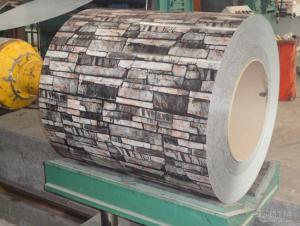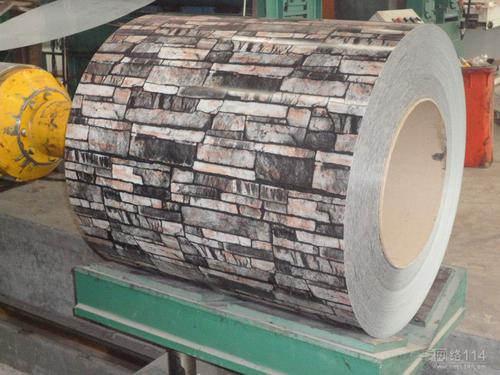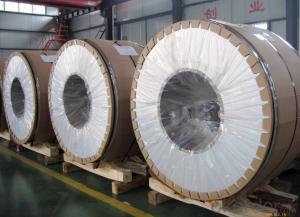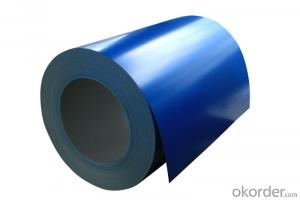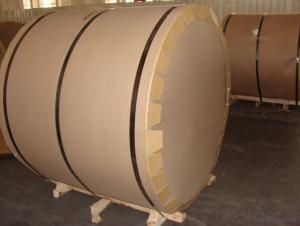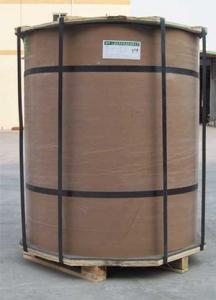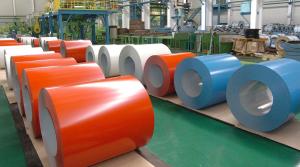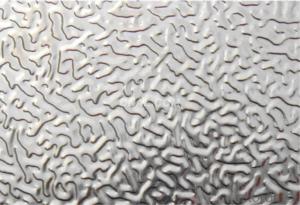Stucco Embossed 5xxx Series Coated Aluminum Coil
- Loading Port:
- China Main Port
- Payment Terms:
- TT OR LC
- Min Order Qty:
- -
- Supply Capability:
- -
OKorder Service Pledge
OKorder Financial Service
You Might Also Like
Product Description:
1 Specifications of PE Coated Aluminum Coil/Sheet
Alloy | AA1050,AA1060, AA1070, AA1100, AA3003, AA3004, AA3005, AA3105, AA5005, AA5052, AA5754, AA5083, AA8011 |
Temper: | H12, H14, H16, H18, H22, H24, H26, H32,HO, F |
Thickness: | 0.10-4.0mm |
Width: | 10mm- 2000mm |
Coating | PE(Polyester) |
Painting Thickness | Standard 16-25 microns, max 40 microns |
Color | Acording to Ral colors or customer’s samples |
Standard: | GB/T17748-1999, ASTM, ISO, EU standard |
Special Specification is available on customer’s requirement | |
Paint Material:PPGI,BECKER, NIPPON.
PE(polyester) Coating
PVDF
2 Usage/Applications of PE Coated Aluminum Coil/Sheet
Our company's PE Coated Aluminum Coil/Sheet have been widely used in the fields of construction and decoration(garage doors, ceiling etc.), electronic appliances, lighting decoration, air-condition air pipe, sanwich panels and drainage, etc.
- Q: How to deal with too much aluminum powder in aluminum striping?
- Currently, there are bag dust-removal system and water dust-removal system. The former is very popular with enterprises because of low maintenance cost, accounting for over 90%. But the problem is the dust accumulation because the ventilation and dust removal systems are not produced in strict accordance with the standard. For example, controlling wind speed does not meet the requirement; ventilation and dust removal system does not meet the requirements of explosion-proof, including the set of pipes, series and parallel connection, the choice of dust removal system, the spark detection and extinguishing measures.
- Q: I want to remove melted aluminium piston material from an engine cylinder with burning a hole in the cylinder!
- I am quite sure any acid strong enough to dissolve aluminium would be able to dissolve iron and steel, as acid + metal equations can be substituted with any metal and any acid.
- Q: What industries utilize aluminum coils?
- There are several industries that utilize aluminum coils for various purposes. One of the major industries that extensively uses aluminum coils is the construction industry. Aluminum coils are commonly used for roofing, siding, and gutter systems due to their lightweight nature, durability, and resistance to corrosion. Additionally, the transportation industry also relies heavily on aluminum coils for manufacturing automotive parts, such as radiators, condensers, and heat exchangers, as aluminum is known for its excellent heat transfer properties. The packaging industry also utilizes aluminum coils for producing cans and containers due to their ability to preserve the freshness and quality of food and beverages. Moreover, the electrical industry relies on aluminum coils for manufacturing transformers, electrical conductors, and wiring, as aluminum is a good conductor of electricity. Lastly, the aerospace industry uses aluminum coils for constructing aircraft parts, such as wings, fuselage, and structural components, as aluminum provides strength while keeping the weight of the aircraft low.
- Q: What are the different coil cutting options for aluminum coils?
- There are several coil cutting options available for aluminum coils, depending on the specific needs and requirements of the project. Some of the common coil cutting options for aluminum coils include: 1. Shearing: Shearing is a process that involves cutting aluminum coils using a shear blade. This method is used for straight cuts and is suitable for thinner gauges of aluminum coils. 2. Slitting: Slitting is a process that involves cutting aluminum coils into narrower strips. The coil is passed through a series of rotating circular blades, which cut it into multiple smaller coils of desired widths. Slitting is commonly used to produce coils for various applications such as roofing, automotive, and packaging industries. 3. Cut-to-Length: In this method, the aluminum coil is cut into individual sheets of desired lengths. The coil is first uncoiled, then passed through a leveling machine to remove any coil set or shape defects, and finally, cut into sheets using a flying shear or a stationary shear. Cut-to-length cutting option is commonly used for applications where precise sheet lengths are required. 4. Laser Cutting: Laser cutting is a highly precise and efficient method for cutting aluminum coils. It involves using a high-powered laser beam to melt and vaporize the metal, resulting in clean and accurate cuts. Laser cutting offers the advantage of cutting complex shapes and patterns and is commonly used in the aerospace and electronics industries. 5. Waterjet Cutting: Waterjet cutting is another precise cutting option for aluminum coils. It involves using a high-pressure jet of water mixed with an abrasive material to cut through the coils. Waterjet cutting is particularly suitable for cutting thicker gauges of aluminum coils and offers the advantage of no heat-affected zones or material distortion. These are some of the different coil cutting options available for aluminum coils. The choice of cutting method depends on factors such as the desired end product, required precision, material thickness, and production volume. It is essential to consider the specific requirements of the project to determine the most suitable cutting option.
- Q: Can aluminum coils be used for electrical transformers?
- Indeed, electrical transformers can utilize aluminum coils. The application of aluminum as a material for transformer coils is attributed to its superior electrical conductivity and cost-effectiveness in comparison to copper. Traditionally, copper has been favored for transformer windings; nevertheless, the utilization of aluminum has gained traction in recent times due to its lighter weight and more affordable price. Additionally, aluminum coils offer advantages in terms of thermal conductivity, as they efficiently dissipate heat in contrast to copper. Nevertheless, it is crucial to take into account the specific demands and design considerations of the transformer, as the decision between aluminum and copper coils may hinge upon factors such as voltage, current, size, and insulation requirements.
- Q: Can aluminum coils be used in electrical cables?
- Electrical cables can indeed incorporate aluminum coils. Aluminum is widely utilized as a material for electrical conductors due to its exceptional electrical conductivity and comparatively lower cost when compared to copper. Its usage is particularly prominent in power transmission and distribution cables that necessitate long-distance transmission. Overhead power lines and underground cables often employ aluminum coils. However, it is crucial to acknowledge that aluminum possesses a lower tensile strength than copper, requiring careful design and manufacturing of the cables to ensure sufficient mechanical strength. Furthermore, achieving the same electrical performance with aluminum conductors necessitates larger cross-sectional areas compared to copper, potentially resulting in slightly larger cable sizes.
- Q: Can aluminum coils be used in electrical busbars?
- Indeed, electrical busbars can utilize aluminum coils. Due to its high electrical conductivity, affordability, and lightweight nature, aluminum is widely employed as a busbar material. Aluminum coils can effortlessly be molded into different configurations and dimensions, tailored to meet specific busbar criteria. Furthermore, aluminum possesses commendable thermal conductivity, facilitating efficient dissipation of heat in applications involving high currents. Nevertheless, it is crucial to take into account the current carrying capacity, mechanical strength, and corrosion resistance of aluminum coils when opting for them in busbar applications.
- Q: Is it safe to use aluminum coils in various applications?
- <p>Yes, aluminum coils are generally safe to use. They are widely used in various industries due to their excellent thermal conductivity, corrosion resistance, and lightweight properties. Aluminum coils are non-toxic and do not emit harmful substances, making them safe for applications such as food packaging and construction. However, safety can depend on specific uses and manufacturing processes, so it's important to ensure that the coils meet the required safety standards for their intended application.</p>
- Q: Will aluminum foil go off in a metal detector
- Aluminum Detector
- Q: This is for handling aluminum
- Aluminum as a solid is very safe; although non-nutritious (your body does not require it), its accumulation in tissues is apparently not directly harmful. Individuals who work years of their lives in handling aluminum have no higher incidence of Alzheimer's disease than those that do not. As a powder- particularly very fine powders- aluminum is extremely hazardous with respect to its combustibility, and is used in fireworks (sparklers, for example). When it burns, it is extremely hot, and extinguishing it should not be attempted without training and the correct tools- usually salt or Purple K extinguishing agent. However, it burns so quickly that it will usually be out before attempts can be made.
Send your message to us
Stucco Embossed 5xxx Series Coated Aluminum Coil
- Loading Port:
- China Main Port
- Payment Terms:
- TT OR LC
- Min Order Qty:
- -
- Supply Capability:
- -
OKorder Service Pledge
OKorder Financial Service
Similar products
Hot products
Hot Searches
Related keywords
